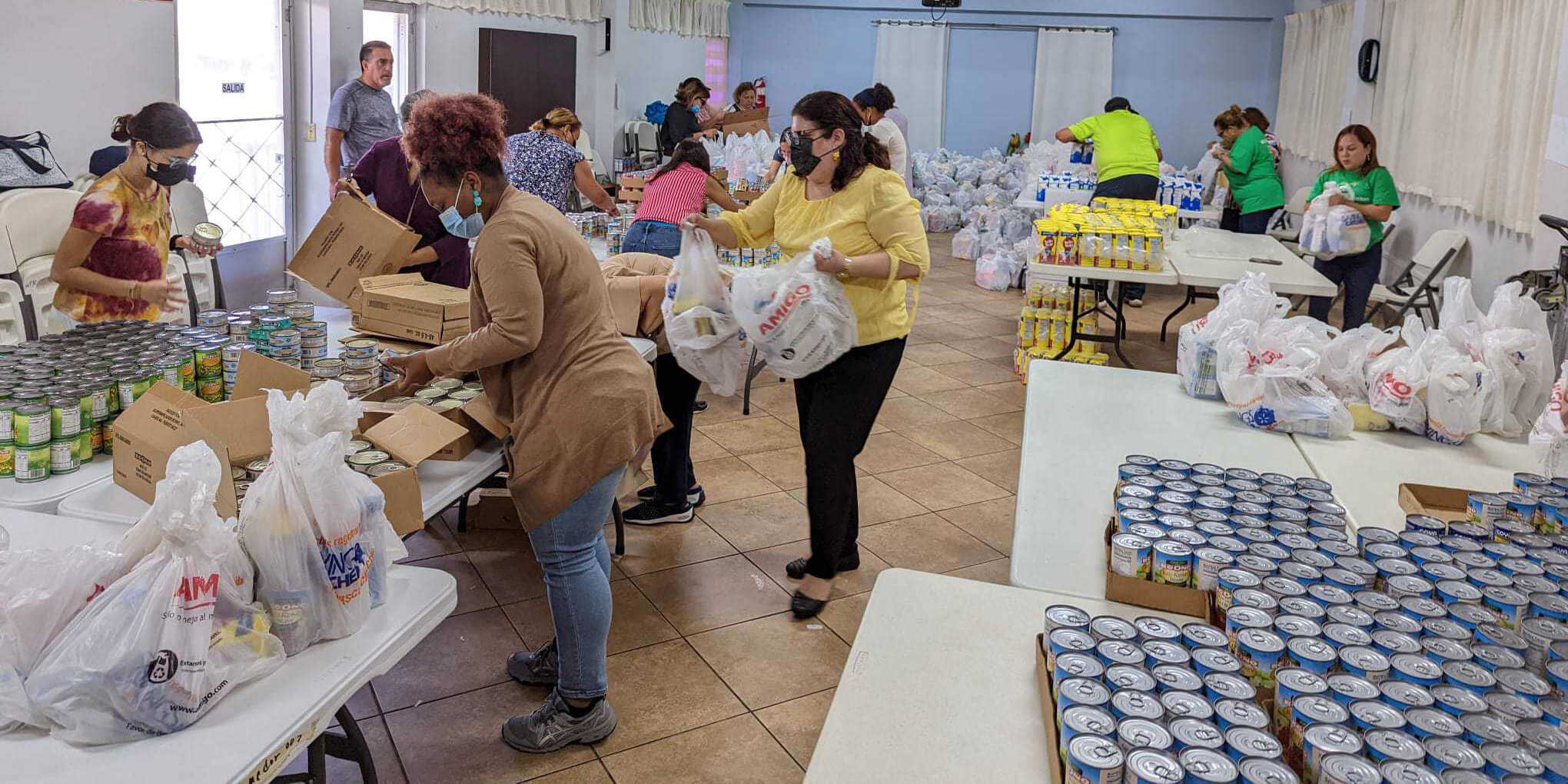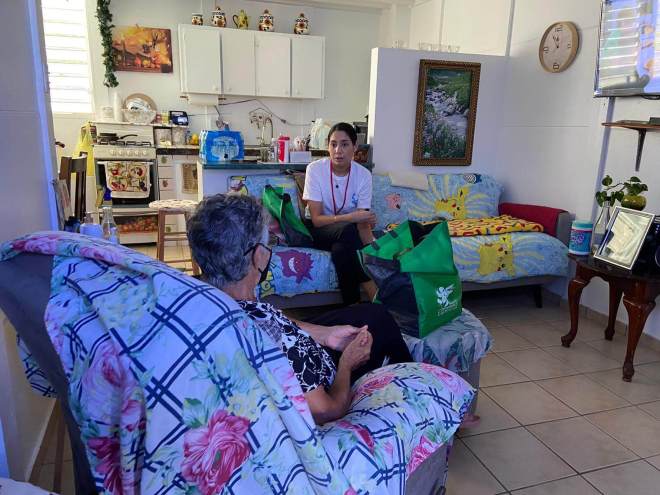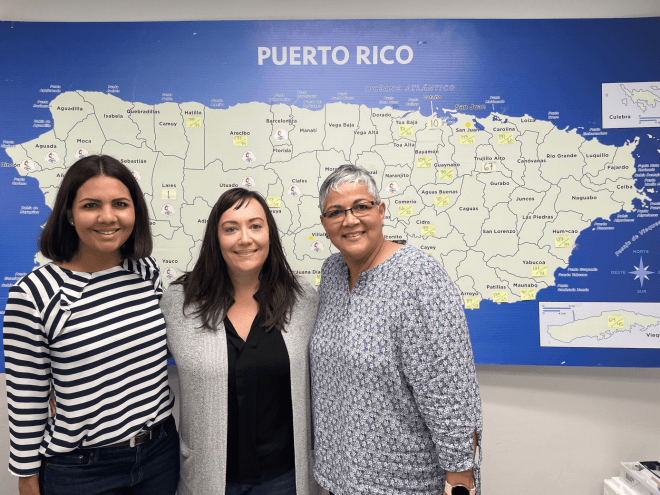Hurricane Maria successes help Methodist Church of Puerto Rico save Fiona lives

According to REHACE, their emergency response efforts for the first three weeks after Fiona included providing more than 8,400 individuals with 3,370 bags of groceries. PHOTO: ERICK MERCADO SANCHEZ/REHACE
By Dan Curran
October 20, 2022 | ATLANTA
Five years spent recovering from a pair of devastating hurricanes, an earthquake swarm, a global pandemic, and now Hurricane Fiona, would test the resolve of any population.
Fortunately for the people of Puerto Rico, lessons learned from response and recovery efforts for Hurricane Maria and those other challenges have helped the Iglesia Metodista de Puerto Rico / Methodist Church of Puerto Rico (MCPR) put plans into action quickly and save the lives of many Hurricane Fiona survivors this year.
Hurricane Fiona, a Category 1 storm when it made landfall, became the first major hurricane of the 2022 season when it struck Puerto Rico on Sept. 18, 2022. In an eerie coincidence, Fiona arrived exactly five years to the day after hurricanes Irma and Maria made landfall two weeks apart in 2017.
It was the decision by MCPR and its social holiness agency REHACE (Rebuilding Communities with Hope) to invest in people and capacity, and the strong working relationship with UMCOR that intensified after Irma and Maria, which helped them hit the ground running, according to Lara Martin, UMCOR’s director of U.S. Disaster Response.

In the years following Maria, MCPR and REHACE worked extensively with UMCOR on immediate and long-term recovery programs. MCPR provided spiritual care, psychological services and operated health clinics. REHACE rebuilt more than 1,300 houses with the help of UMCOR grants, REHACE staff expertise, local resources and countless groups of United Methodist volunteers who traveled to the island on work trips.
According to REHACE, their emergency response efforts for the first three weeks after Fiona included providing more than 8,400 individuals with 3,370 bags of groceries. Between 60-70% of clients receiving care after Maria and Fiona are single women over the age of 60. Each bag contained food for an average of 2.5 individuals per household for two days. Fifty communities were impacted by this effort achieved with 1,298 volunteer hours.
“MCPR is a great success story in disaster response and recovery,” stated Martin. “When we reconnected prior to Fiona’s arrival, their operations for Maria were winding down. They were able to effectively pivot those disaster ministry team resources and utilize solidarity grant monies toward immediate needs to get started quicker and be more effective.”
News reports documented how Fiona left the vast majority of Puerto Rico and its three million residents without power or water for several days. Less documented was that the island had experienced the longest blackout in U.S. history after Maria and Fiona’s power issues were causing new mental stress among its citizens. Even now, almost four weeks later, about 20,000 customers – the equivalent of 40,000 people – remain without power, according to the utility company’s own figures.
The worst-affected neighborhoods are in the south and southwest of the island, where Fiona made landfall. This is the same region that experienced the earthquake swarm that started in 2019 and resulted in upwards of 3,000 homes being destroyed or significantly damaged.
The entire grid experiences random power outages daily and that opens opportunities for sustainability support. To help overcome the power challenges, UMCOR, with the Environmental Sustainability program of Global Ministries, shipped 5,000 units of solar-powered lights that range in ability from serving as a task light to being strong enough to fully recharge a cell phone. Similar to ones that were popular with Maria survivors, Luci lights are now more versatile, last longer and can be charged by USB port.

Recently, Glorymar Rivera-Báez, executive director of REHACE, and Bishop Lizzette Gabriel Montalvo of MCPR, briefed Martin on the extensive response and recovery efforts for Hurricane Fiona.
“We know the needs of Puerto Rico continue to be quite significant,” Martin shared. “We are committed to journeying with the MCPR and the people of Puerto Rico as they once again deal with a significant disaster.”
“The way that REHACE and the MCPR focus on survivor’s needs, and the emotional and mental care provided to those in need, along with the courage shown by the team, should be an inspiration to others,” she stated.
Martin hopes to return this fall and travel outside the metro area so she can be present with people in the affected communities. She believes this would be helpful to MCPR and REHACE leadership as together they design and support long-term recovery programming to help those impacted by Fiona.
With this year’s storms, UMCOR’s legacy of being “early in, last out” means that United Methodists will be there to accompany recovering communities for years to come. Individuals and congregations wishing to support those impacted by this and other U.S. disasters can replenish UMCOR relief supplies in consultation with local conference disaster response coordinators and by contacting local supply depots for drop-off information. Provide financial support for UMCOR U.S. Disaster Response by giving to Advance #901670.
Dan Curran is a public relations consultant for Global Ministries and UMCOR.

